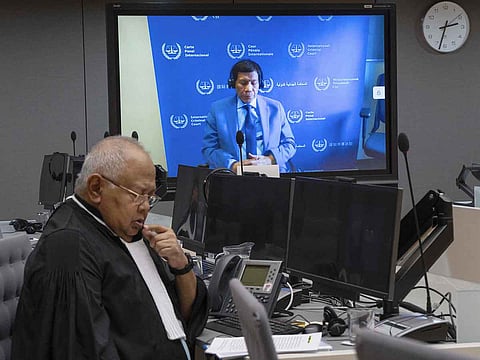Duterte: Meet his top defence attorney, British-Israeli Nicholas Kaufman, international law expert
Defence led by seasoned lawyers with history of overturning cases in clients' favor

Manila: As former President Rodrigo Duterte faces trial at the International Criminal Court (ICC) for alleged crimes against humanity during his war on drugs, it’s essential to consider his legal record, his defence team, and the factors that could impact his case.
Here's what we know so far....
While many have been critical of his controversial policies, there is significant reason to believe that Duterte’s legal team, with its established track record, can mount a powerful defence that could challenge the charges against him.
Duterte’s legal team is led by seasoned lawyers with a history of overturning cases in favor of their clients.
High-profile case
These legal experts are well-known for their deep understanding of both domestic and international law, particularly in defending high-profile figures against what they argue is politically motivated persecution.
Their expertise includes successfully handling sensitive cases where accusations are framed within a political context rather than grounded in clear legal violations.
Track record
This is particularly relevant in Duterte’s case, where accusations of human rights abuses have been overshadowed by the political dynamics surrounding his administration’s approach to crime and drug use.
of the most notable aspects of Duterte's defence strategy is the legal team’s record in fighting against attempts to pin charges on their clients. In the past, they have successfully overturned convictions in cases that many believed were politically motivated.
Previous victories
For instance, they have secured victories in cases involving high-level officials accused of corruption and other misconduct, where the legal defence argued that the charges were inflated or lacked substantial evidence.
This track record suggests that Duterte’s legal counsel is equipped with the tools and experience needed to challenge the ICC's jurisdiction and the legitimacy of the accusations.
Duterte’s defense will likely hinge on several key factors that could lead to the dismissal of the case.
Possible defence arguments
#1. Jurisdiction
First, there is a strong argument that the ICC lacks jurisdiction over the matter, especially given that the Philippines withdrew from the court in 2019.
This move has been a central point in Duterte’s legal defense, and his lawyers will likely argue that the ICC’s actions in this case are beyond their authority, as the country was no longer a member at the time of the alleged crimes.
#2. Sovereignty principle
Second, the defence will emphasize the principle of state sovereignty, which is foundational in international law.
Duterte's legal team could argue that his policies, including the controversial war on drugs, were within the scope of Philippine law, and the international community has no right to intervene in a nation's domestic affairs, especially when the government is fulfilling its responsibility to protect its citizens.
#3. Rules on evidence
Furthermore, Duterte’s team will point to the lack of clear, substantiated evidence of his direct involvement in any extrajudicial killings.
Although accusations of human rights violations are serious, the defense could argue that Duterte’s rhetoric, often harsh, was not meant to incite violence but to inspire action against drug-related criminality.
They could also argue that the high crime rates during his tenure provided a context for such actions, making them part of a broader, lawful effort to restore order.
The 'Octopus lawyer'
His chief defence lawyer is Nicholas Kaufman, 56, a British-born Israeli lawyer specialising in international criminal law and arbitration.
Kaufman, who holds dual British and Israeli nationality, pursued his legal education in the United Kingdom and furthered his studies at the École Nationale d'Administration in Paris. He was called to the Bar of England & Wales in 1991 and to the Bar of Israel in 1995.
Professionally, Kaufman has held several significant positions:
Senior District Attorney in the Office of the District Attorney of Jerusalem from 1996.
Prosecutor at the International Criminal Tribunal for the Former Yugoslavia.
Prosecutor at the International Criminal Court (ICC) in The Hague.
After his tenure as a prosecutor, Kaufman transitioned to defence counsel, representing clients in high-profile international cases. Notably, he has also advocated on behalf of various victim groups, particularly in Africa.
In 2014, he called for the prosecution of Agathon Rwasa and Pasteur Habimana of the National Forces of Liberation in Burundi for their alleged roles in the 2004 Gatumba Massacre.
Kaufman's proactive and, at times, aggressive representation of Darfur victims at the ICC in the case against Sudan's Omar al-Bashir earned him the nickname "the Octopus Lawyer."
He was notably critical of the ICC Prosecutor Fatou Bensouda's decision in December 2014 to halt investigations in Darfur.
In March 2022, Kaufman was appointed as counsel for Maxime Jeoffroy Eli Mokom Gawaka in proceedings before the ICC related to the situation in the Central African Republic.
Kaufman continues to be active in international legal circles.
Impressive record
While the ICC case against Duterte is significant, his legal team has an impressive history of overturning high-profile cases.
With arguments based on jurisdiction, state sovereignty, and insufficient evidence, Duterte's defense has a compelling chance to challenge the charges against him.
The outcome of the case will depend on how these factors are addressed in the courtroom. Duterte’s legal team remains confident in their ability to protect him from a conviction.



